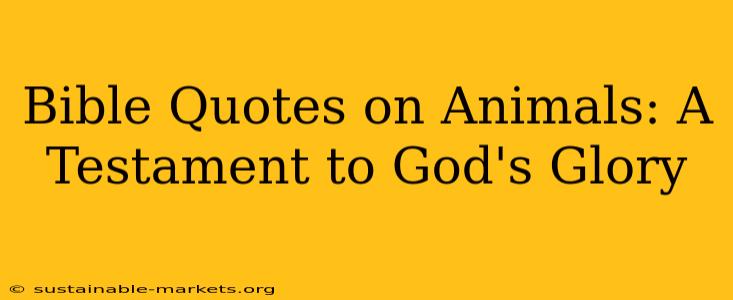The Bible, a rich tapestry of stories, poetry, and prophecy, frequently mentions animals, not merely as background details but as integral parts of its overarching message. From majestic creatures to the humblest insects, animals in the Bible reflect God's creative power, His wisdom, and His care for all of creation. This exploration delves into the significant role animals play within biblical narratives and explores the profound spiritual lessons they impart.
What animals are mentioned most in the Bible?
This is a fascinating question with no single definitive answer, as frequency varies depending on the translation and the method of counting (e.g., individual mentions versus species). However, sheep, goats, oxen, and doves are consistently among the most frequently mentioned animals. This reflects the agricultural and sacrificial practices prevalent in biblical times. Their frequent appearances highlight their economic and religious significance within the context of ancient Israelite life. Beyond these common animals, lions, eagles, serpents, and fish also hold symbolic weight and appear repeatedly, each conveying distinct spiritual meanings.
What is the significance of animals in the Bible?
Animals in the Bible serve multiple significant purposes:
-
Symbols of God's Power and Creation: The sheer diversity and magnificence of the animal kingdom showcased in the creation narrative (Genesis 1) serve as a testament to God's boundless power and creative genius. The majestic lion, the soaring eagle, the swift gazelle—each represents a facet of God's awesome artistry.
-
Metaphors for Human Behavior: Animals are frequently used as metaphors to illustrate human characteristics. The shepherd tending his flock mirrors God's care for His people, while the lion's ferocity can symbolize the destructive power of sin or worldly forces. The serpent's cunning represents temptation, and the dove's gentleness signifies the Holy Spirit.
-
Participants in Salvation History: Animals play active roles in key biblical events. The sacrificial lamb prefigures the ultimate sacrifice of Jesus Christ, highlighting the redemptive power of God's love. The use of animals in sacrifices underscores the concept of atonement and the need for reconciliation with God.
-
Reflections of God's Provision and Care: The provision of animals for food and clothing, as seen throughout the Old Testament, demonstrates God's care and provision for His people. This aspect underscores God's ongoing commitment to sustaining and protecting His creation.
What does the Bible say about animal cruelty?
While the Old Testament describes practices that might be viewed as cruel by modern standards, the overall message emphasizes responsible stewardship and respect for God's creation. The laws regarding animal sacrifice, for example, contained specific guidelines aimed at minimizing suffering. Proverbs 12:10 states, "A righteous man cares for the life of his animal," indicating a concern for animal welfare. The New Testament builds upon this theme by highlighting the interconnectedness of all creation and the importance of compassion towards all living beings.
What are some specific examples of Bible quotes about animals?
Numerous verses highlight the significance of animals:
-
Genesis 1:24-25: "And God said, ‘Let the land produce living creatures according to their kinds: the livestock, the creatures that move along the ground, and the wild animals, each according to its kind.’ And it was so. God made the wild animals according to their kinds, the livestock according to their kinds, and all the creatures that move along the ground according to their kinds. And God saw that it was good." This passage establishes the importance of animals in God's creation.
-
Psalm 104: This entire Psalm is a poetic celebration of God's creation, emphasizing the beauty and wonder of the animal kingdom.
-
Isaiah 11:6: "The wolf will live with the lamb, the leopard will lie down with the goat, the calf and the lion and the yearling together; and a little child will lead them." This prophetic verse paints a picture of a peaceful future where the natural order reflects God's ultimate reign of peace and harmony.
-
Matthew 6:26: "Look at the birds of the air; they do not sow or reap or store away in barns, and yet your heavenly Father feeds them. Are you not much more valuable than they?" This verse emphasizes God's provision and care, using birds as an example.
Conclusion
The Bible's numerous references to animals reveal far more than simple descriptions of the natural world. They offer profound insights into God's character, His relationship with humanity, and the interconnectedness of all living things. By studying these passages, we gain a deeper appreciation for the beauty and complexity of God's creation and our role as responsible stewards of His earth. The animals within the biblical narrative serve as powerful symbols, reminders of God's power, and illustrations of important spiritual truths.

